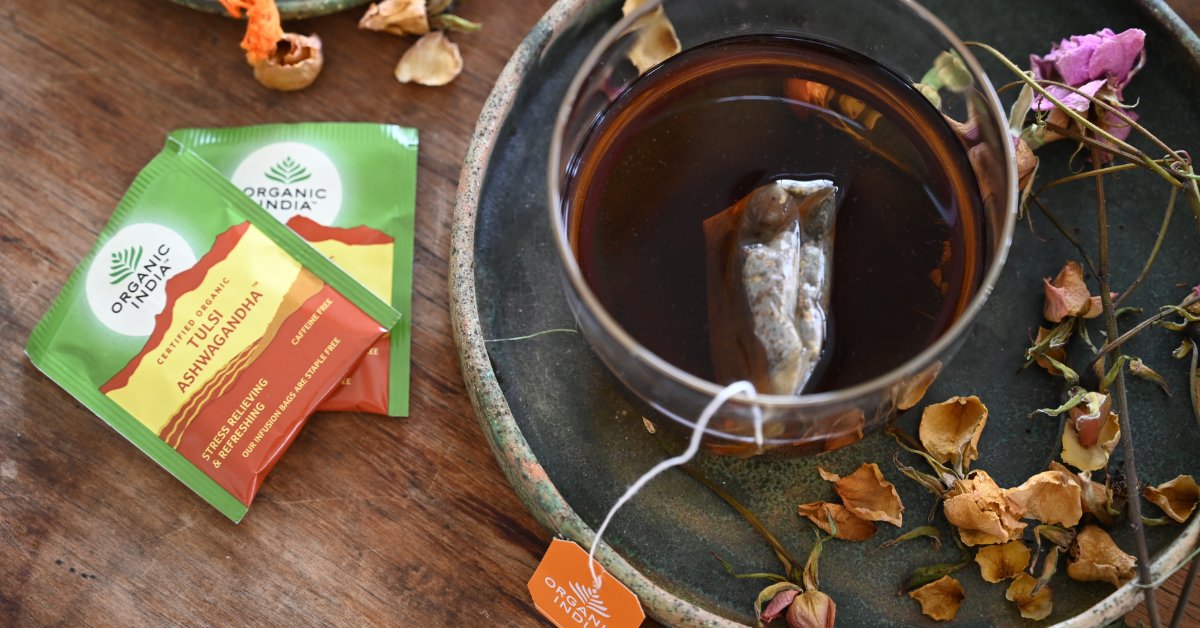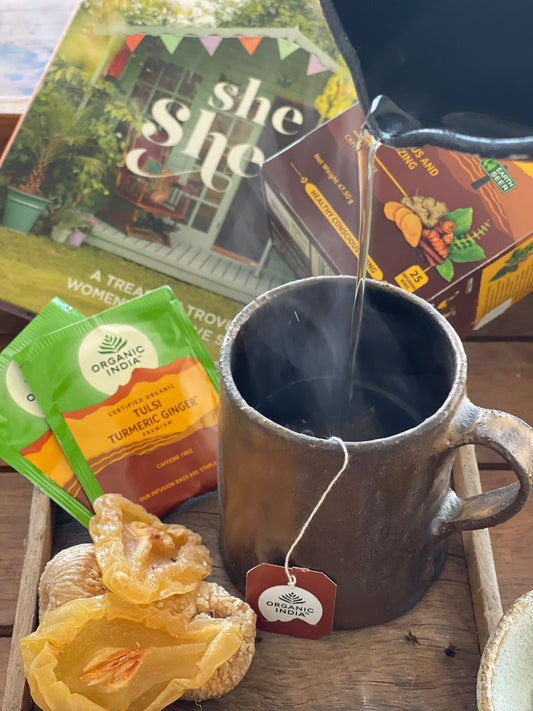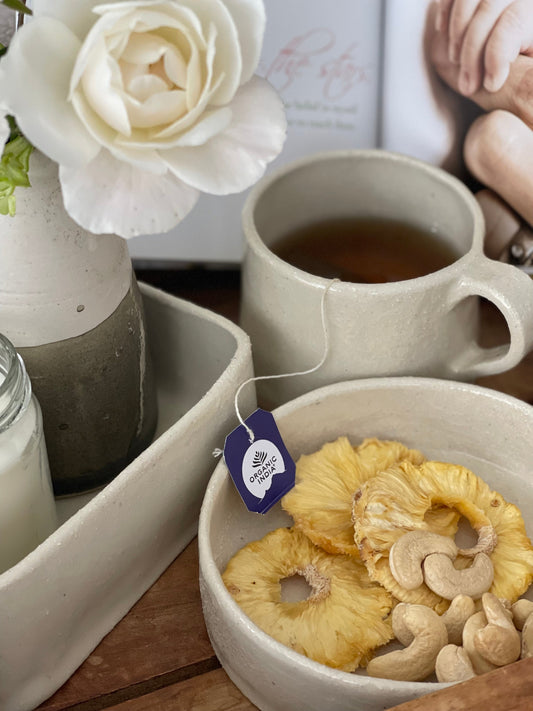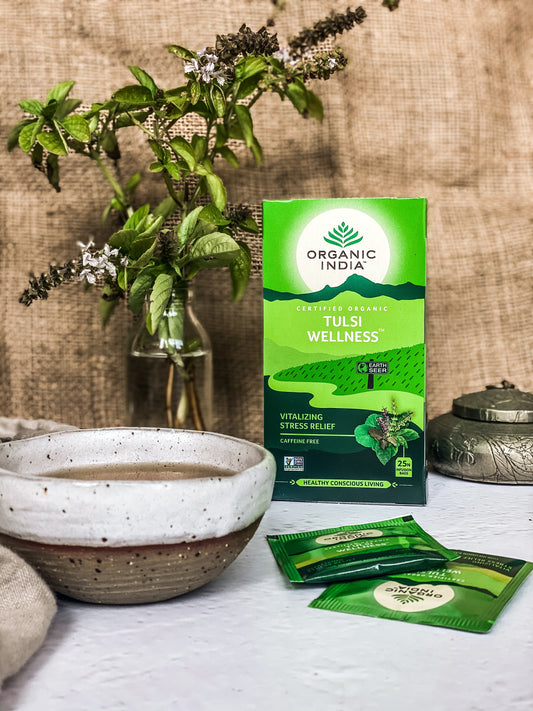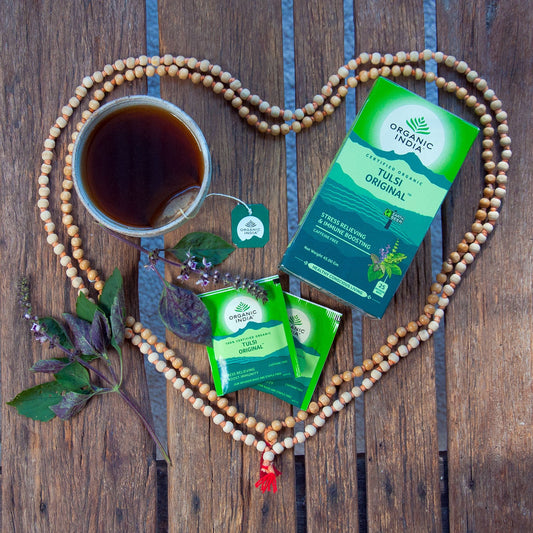ORGANIC INDIA’s foundational herb, Tulsi, also called Holy Basil, was chosen for its broad-spectrum health-supporting properties. Tulsi is a flowering plant in the mint family and has beautifully aromatic leaves. This exalted medicinal herb, native to the Indian subcontinent, is packed with immune-modulating phytochemicals that support the body in maintaining a state of vitality. It is also a potent adaptogen, which means it performs significant physiological actions that help the whole body-mind system adapt to and relieve mental, physical and environmental stress.
Not only is Tulsi a powerful plant on its own, it works synergistically with other Ayurvedic adaptogenic herbs such as Turmeric and Ashwagandha, making it the perfect enhancer for any tea or supplement. It also is said to behold a nurturing, feminine energy or essence according to the traditional Indian medicine system. That’s why balancing Tulsi is included in many Ayurvedic medicinal formulas, to get the most benefit of key herbs and spices for deep nourishment and sustained wellness.

What sets ORGANIC INDIA Tulsi apart?
ORGANIC INDIA takes every avenue to operate in a way that is Beyond Sustainable, for both the planet and the amazing partners we work with. Our Tulsi is grown, harvested and prepared in adherence to the following principles and practices:
- Fair Trade. The first Tulsi supplement in the world to be Fairtrade Certified in alignment with our deep commitment to fair practices.
- Small Family Farmers. Ethical partnerships are the heart and soul of our company. We contract with small, family-owned farms across India and purchase crops at premium market price. Most of our partners have been with us for more than ten years, and each is an integral part of our herbal family. As indispensable members of our team, we provide all of our farmers health insurance and ongoing training by agricultural experts who are at the cutting edge of organic and regenerative farming—a no-brainer for us, but an unfortunately unheard of practice in the industry.
- Regenerative Agriculture. We are deeply rooted in agriculture that is beyond sustainable—it’s regenerative. What this means is our farming practices not only preserve the land, they make it better. Regenerative means replenished soil, improved biodiversity, enhanced water conservation, and increased carbon sequestration. We look beyond our crop to the whole earth and our responsibility to it as a healthy conscious living company.
Tulsi Body and Mind Benefits
Tulsi has been used for thousands of years to support a healthy mind, body and spirit. Our Tulsi formulas are created with our signature stress-relieving blend of three variants: Rama, Vana, and Krishna Tulsi to amplify its mind-body health benefits.
Here are some of the many benefits of Tulsi, backed by modern research:
- Stress Relief. Tulsi is classified as an adaptogenic herb known to support the body in handling physical, metabolic and mental stress.
- Immune Support. There are phytochemicals in Tulsi leaves that have been found to support healthy immune function.
- Detoxification. Tulsi has also been found to assist in the body’s internal cleansing and purifying process, and can aid in healthy digestion and elimination.
- Harmonization. Due to its calming, uplifting and meditative effect, Tulsi has been referred to in the Journal of Ayurveda and Integrative Medicine as “liquid yoga.”
- Environmental Protection. Tulsi can also help the body protect itself against toxicants and pollutants in the environment.
- Clarifying. Tulsi is regarded as a “vehicle of consciousness” and is traditionally believed to invoke greater clarity and awareness.
Traditional Significance of Tulsi
In the ancient Vedic Bhagavata Purana text, Tulsi, called “Queen of Herbs,” is noted as the plant embodiment of Lakshmi, wife of Vishnu and the goddess of wealth and generosity. In Hindu mythology, Tulsi is regarded as a living gateway between heaven and earth, and believed to be a manifestation of the divine within the plant kingdom. But it’s not just in India that Tulsi was significant. As Tulsi traveled west along the early trade routes from Asia to Europe, it became known to Christians as “sacred” or “holy” basil and was used in rituals.
Across cultures, Tulsi was a symbol of purity and used for a range of physical, mental and spiritual purposes. It was used in traditional folk medicine for immune and respiratory support, kidney support, heart health, oral health, eye health and much more. The leaves were prepared in various classical, homemade preparations like extracts, powders and teas.
Where is Tulsi grown?
Our Tulsi is grown in the Uttar Pradesh region, located in northern India edging on the foothills of the Himalayas south of Nepal. Tulsi is believed to have originated here in north central India, but grows throughout the Indian subcontinent, Bangladesh, Eastern Nepal, China and much of Southeast Asia. Tulsi is hardy in zones 10 and 11.
Who is it for?
Tulsi supplements and teas are wonderful for anyone who is looking for a greater sense of relaxation, clarity and wellbeing. It can be a great herbal ally to more easily manage physical, environmental and mental stressors. It is advised that children, and pregnant and nursing women not consume Tulsi. Be sure to consult with your doctor before consuming Tulsi if you are on medications.
“Emerging science on tulsi, which reinforces ancient Ayurvedic wisdom, suggests that tulsi is a tonic for the body, mind and spirit that offers solutions to many modern day health problems.”
